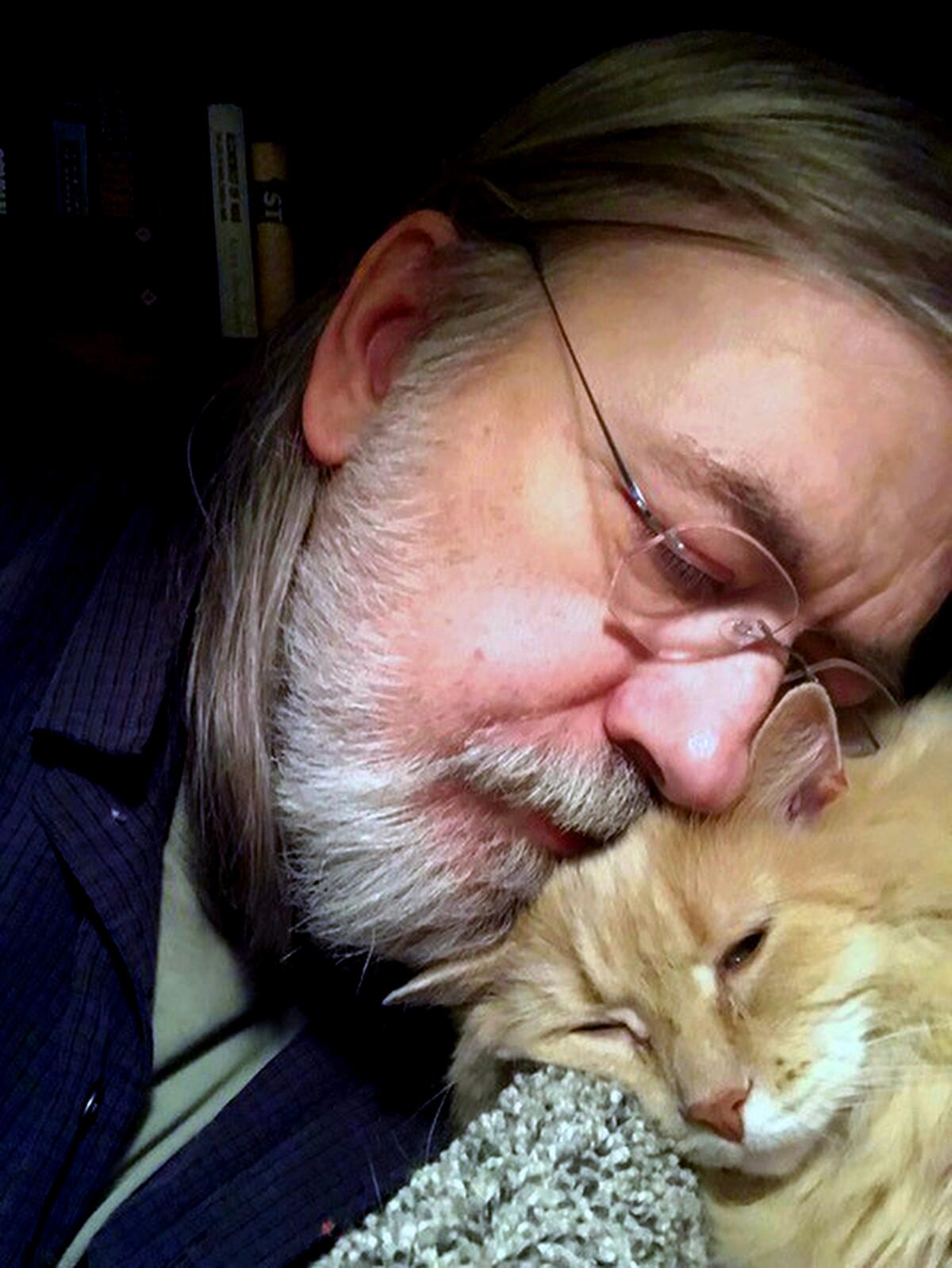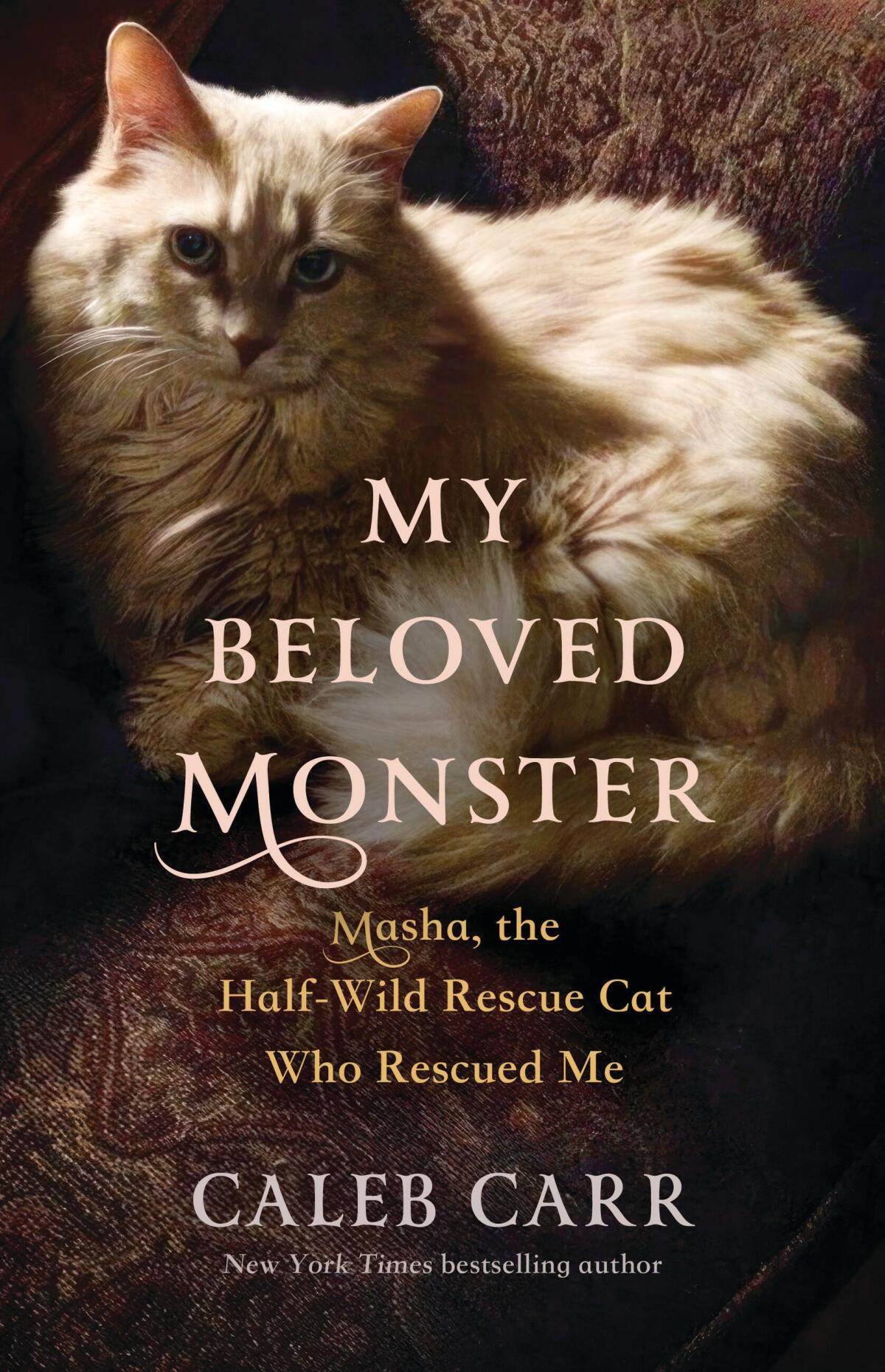Appreciation: For ‘Alienist’ author Caleb Carr, rescuing a cat meant rescuing himself

- Share via
Caleb Carr, the novelist and military historian who died of cancer Thursday at age 68, was best known for exploring the darker angels of human nature. His breakout novel, “The Alienist” (1994), helped pioneer the historical thriller as we know it, telling the grisly tale of a child psychiatrist tracking a killer of young male prostitutes in 1890s New York. His other books include a sequel, “The Angel of Darkness” (1997), and a historical study of terrorism and warfare, “Lessons of Terror” (2002).
But when I had a late-night, hourlong conversation with Carr in late January, we mostly talked about our mutual love of cats.
Carr, his illness already far along, was eagerly awaiting the publication of what he correctly figured would be his final book, “My Beloved Monster.” It’s the story of his bond with Masha, the Siberian forest cat with whom he shared his fortress of a home in upstate New York, near a ridge called Misery Mountain. Contracted to do a third “Alienist” book, Carr instead called an audible, choosing to write his first memoir. Dipping briefly into his tortured childhood — he was regularly beaten by his father, the journalist and Beat poet muse Lucien Carr, and grew up in hardscrabble bohemian conditions on Manhattan’s Lower East Side — the book’s primary subject is how Carr found solace in the unconditional love of animals, and with his grief for Masha, who died in April 2022.
Staring down death, talking about grief, he was casually, effortlessly, macabrely funny that night. He spoke of how he argued with his publisher, Little, Brown, to forgo the standard “Author of ‘The Alienist’” tag on the front cover, which features a photo of his blond, fluffy rescue cat: “I thought, ’Guys, they’re going to think I wrote a book about murdering cats or some horrible thing.’” He discussed the challenges of getting cat lovers to read a Caleb Carr book: “We may have to convince them. These may not be people who spend their time reading grim stories about serial killers 130 years ago.”
Caleb Carr discusses grief and dying — subjects that linger over his new nonfiction book, “My Beloved Monster,” and now loom over what might be the final months of his life.
And we talked a lot about what animals can teach us, and how they can even provide a kind of love that many of us didn’t know growing up. Even in childhood, when his father was knocking him down flights of stairs, Carr had pets to comfort him. “It’s amazing to think about it now, but there were cats, and other animals, that were trying to make me feel better,” he said. “The idea of that was so at odds with everything I was experiencing.”
I didn’t realize how much I had in common with the guy who wrote “The Alienist,” a book I admire for its vivid, doggedly researched detail but whose author I hadn’t studied. We were both basketball freaks; when we spoke, Carr’s beloved Knicks were on a roll (“They’re doing scarily well,” he said). We both survived childhoods fraught with danger, though mine wasn’t as dramatic or brutal as Carr’s. And we have both found comfort in the companionship of cats, known for self-sufficiency but also, quiet as it’s kept, quite loving and dependable when the chips are down. If you have a cat, and you’re not feeling well, that cat won’t stray far.
As we talked, my attention-hogging, gray-and-white tuxedo cat, Mr. Kitty, strolled in front of my laptop camera. “He’s cool-looking!” Carr enthused, the energy in his voice rising. I explained that he was a good cat but could also get pretty aggressive with his teeth and claws. He likes human flesh. “Well, they’re hunters,” Carr replied. “They’re wildlings. Sitting inside, being all the things that they’re pictured as being in Victorian literature, is not their nature.” Over the years I have always tried not to get mad at my cats for being cats — knocking things over, going on the attack when I least expect it. Carr’s words have actually helped me succeed in this endeavor.

Carr, too, could have been a wildling. “I could have been one of those dead-eyed drone troublemakers that comes out of an abusive household very easily, if it hadn’t been for cats,” he told me. His childhood home life was chaos, but he and his siblings always had pets. “All the animals we had really did teach us enough about love that we understood it outside of any human definition, although this was never something I talked about with anybody,” he said.
Carr’s longtime agent, Suzanne Gluck, was also a friend since they were both in high school at Friends Seminary in Manhattan. The irony of a future military historian attending a Quaker school is not lost on Gluck. “He was such a square peg in a round hole,” Gluck said in an interview the day after Carr’s death. “The administration really didn’t know what to make of him.”
He didn’t talk much about his home life then. And he was no misanthrope. “He was this pied piper,” Gluck said. “He was this very vibrant, interesting, thoughtful, charismatic guy with a lot of friends. He wasn’t someone sitting in the corner, troubled and wanting to be alone.”
Gluck recalls her response when Carr told her he was writing about Masha instead of serial killers: “This might be where the music stops.” The assignment, after all, called for more “Alienist.” But Bruce Nichols, then the publisher at Little, Brown and Carr’s editor, loved the story of Masha. (As the husband of a veterinary behaviorist , his might have been the perfect pair of eyes for the project.)
“When I read it, I just stopped thinking about ‘The Alienist,’” Nichols said. “I stopped thinking about fiction and just thought about all the great books that had been written as memoirs by dog and cat owners”— books like “Merle’s Door,” Ted Kerasote’s account of lessons learned from his Labrador mix. Carr, and Masha, got the go-ahead.
Readers should be thankful for that. Carr wasn’t in need of redeeming in his final years, but “My Beloved Monster” is nonetheless an act of redemption. It gives specific life, and teeth and claws, to that old cliché about how we don’t rescue animals; they rescue us.
More to Read
Sign up for our Book Club newsletter
Get the latest news, events and more from the Los Angeles Times Book Club, and help us get L.A. reading and talking.
You may occasionally receive promotional content from the Los Angeles Times.








